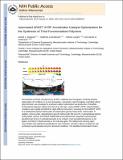Automated ARGET ATRP Accelerates Catalyst Optimization for the Synthesis of Thiol-Functionalized Polymers
Author(s)
Siegwart, Daniel J.; Leiendecker, Matthias; Anderson, Daniel Griffith; Langer, Robert S
DownloadLanger_Automated_arget.pdf (4.205Mb)
PUBLISHER_POLICY
Publisher Policy
Article is made available in accordance with the publisher's policy and may be subject to US copyright law. Please refer to the publisher's site for terms of use.
Terms of use
Metadata
Show full item recordAbstract
Conventional synthesis of polymers by ATRP is relatively low throughput, involving iterative optimization of conditions in an inert atmosphere. Automated, high-throughput controlled radical polymerization was developed to accelerate catalyst optimization and production of disulfide-functionalized polymers without the need of an inert gas. Using ARGET ATRP, polymerization conditions were rapidly identified for eight different monomers, including the first ARGET ATRP of 2-(diethylamino)ethyl methacrylate and di(ethylene glycol) methyl ether methacrylate. In addition, butyl acrylate, oligo(ethylene glycol) methacrylate 300 and 475, 2-(dimethylamino)ethyl methacrylate, styrene, and methyl methacrylate were polymerized using bis(2-hydroxyethyl) disulfide bis(2-bromo-2-methylpropionate) as the initiator, tris(2-pyridylmethyl)amine as the ligand, and tin(II) 2-ethylhexanoate as the reducing agent. The catalyst and reducing agent concentration was optimized specifically for each monomer, and then a library of polymers was synthesized systematically using the optimized conditions. The disulfide-functionalized chains could be cleaved to two thiol-terminated chains upon exposure to dithiothreitol, which may have utility for the synthesis of polymer bioconjugates. Finally, we demonstrated that these new conditions translated perfectly to conventional batch polymerization. We believe the methods developed here may prove generally useful to accelerate the systematic optimization of a variety of chemical reactions and polymerizations.
Date issued
2012-02Department
Harvard University--MIT Division of Health Sciences and Technology; Massachusetts Institute of Technology. Department of Chemical Engineering; Koch Institute for Integrative Cancer Research at MITJournal
Macromolecules
Publisher
American Chemical Society
Citation
Siegwart, Daniel J., Matthias Leiendecker, Robert Langer, and Daniel G. Anderson. Automated ARGET ATRP Accelerates Catalyst Optimization for the Synthesis of Thiol-Functionalized Polymers. Macromolecules 45, no. 3 (February 14, 2012): 1254-1261.
Version: Author's final manuscript
ISSN
0024-9297
1520-5835